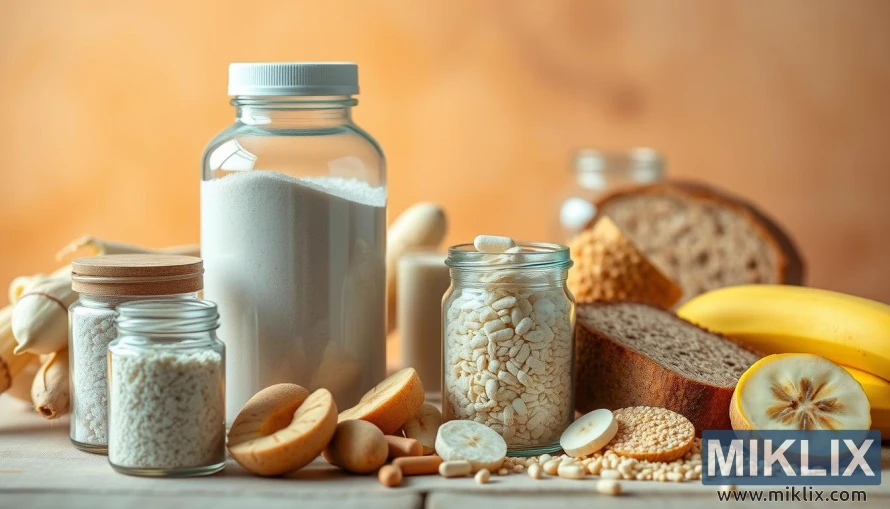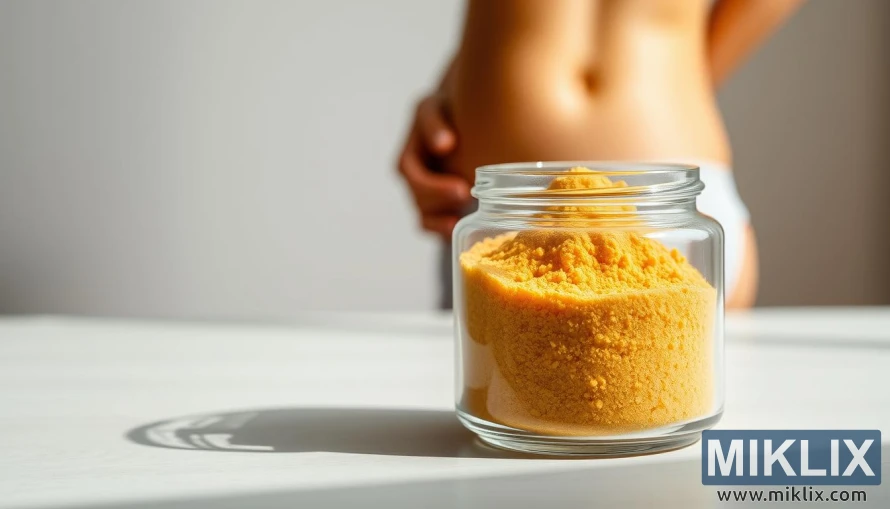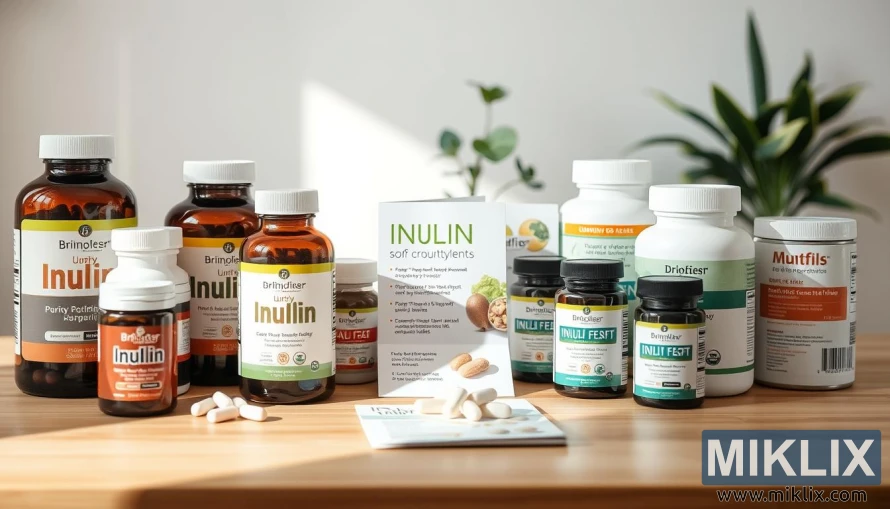Fuel Your Microbiome: The Surprising Benefits of Inulin Supplements
Published: July 2, 2025 at 12:28:37 PM UTC
Inulin supplements have become increasingly popular for their health benefits, focusing on digestive health, weight management, and blood sugar control. This soluble dietary fiber acts as a powerful prebiotic. It promotes the growth of beneficial gut bacteria, leading to a balanced microbiome. This article will explore how inulin boosts overall well-being, highlighting its benefits for digestive health, weight loss, and blood sugar regulation.

Key Takeaways
- Inulin supplements offer significant digestive health benefits.
- They provide essential prebiotic benefits for gut microbiome balance.
- Inulin supports effective weight management strategies.
- This soluble fiber can help maintain stable blood sugar levels.
- Incorporating inulin into your diet can enhance overall health.
Introduction to Inulin Supplements
Inulin supplements have gained popularity for their health benefits and role as a soluble dietary fiber. Understanding why people incorporate inulin into their daily routines is key. It aids in digestive health by promoting regularity and balancing gut flora.
Inulin supplements also offer a practical solution for weight management. They add bulk to meals without increasing calorie intake, leading to longer feelings of fullness. Scientific studies have highlighted numerous health advantages of inulin, making it a valuable addition to a healthy diet.
What is Inulin?
Inulin is a type of soluble fiber found in various plants. It acts as a reserve energy source for these plants. It is also a prebiotic, supporting beneficial gut bacteria and contributing to a healthy microbiome.
Inulin is made up of a chain of fructose molecules. These molecules resist digestion in the small intestine. This means they reach the colon intact, where they play a key role in improving gut health. They stimulate the growth of good bacteria. Knowing about inulin and its role as a soluble fiber can greatly benefit digestive wellness and overall health.
Natural Sources of Inulin
Inulin is abundant in nature, found in about 36,000 plant species. Chicory root is the most concentrated source. Many look for sources of inulin to benefit from its health perks. This dietary fiber is found in various foods containing inulin, making it simple to add to our diets.
Some key sources of inulin include:
- Jerusalem artichokes
- Garlic
- Onions
- Asparagus
These foods provide prebiotic benefits and are loved for their unique tastes. Inulin is also used in processed foods, improving texture and nutritional content. It's a low-calorie substitute for fats. As more people learn about inulin's health benefits, they're finding ways to include these foods containing inulin in their meals.

Inulin as a Soluble Dietary Fiber
Inulin is known mainly as a soluble dietary fiber. It dissolves in water, forming a gel-like substance in the digestive tract. This unique property makes it essential for digestive health. The gel it forms slows digestion, leading to longer feelings of fullness. This can help control appetite.
It also supports digestive health by encouraging the growth of beneficial gut bacteria. This prebiotic effect improves gut flora balance and enhances nutrient absorption. By slowing cholesterol absorption, inulin aids in cardiovascular health.
Adding inulin to your diet offers several health benefits. Foods high in soluble dietary fiber improve gut function and provide steady energy by regulating blood sugar. As people look for ways to boost their health, knowing about inulin's role is key.
Benefits of Inulin for Digestive Health
Inulin is a key player in digestive health. It's a soluble fiber that boosts the count of beneficial bacteria in the gut. This includes Bifidobacteria and Lactobacilli, vital for gut function and health.
One of inulin's standout benefits is its ability to combat constipation. It adds bulk to stool, promoting regular bowel movements. This ensures a smoother digestive process. Studies have shown that inulin can significantly improve digestion and overall health when added to the diet.
Inulin and Weight Management
Inulin provides several benefits that can aid in weight management. It is a soluble fiber that promotes satiety, making individuals feel fuller for longer. This can lead to a reduction in overall calorie intake, supporting weight loss efforts.
Studies indicate that adding inulin to daily diets can aid in weight loss, mainly for those with prediabetes or metabolic syndrome. Its influence on appetite hormones and digestion rate is key to this effect.
Incorporating inulin for weight loss offers more benefits:
- It helps maintain steady blood sugar levels, reducing cravings.
- It encourages healthy gut bacteria, which aids in weight regulation.
- It acts as a prebiotic, improving overall digestive health.
Dietary fiber is essential for maintaining a healthy weight. Inulin is a strategic choice for weight management and enhances nutritional intake.

Inulin's Effect on Blood Sugar Levels
Inulin significantly impacts blood sugar control by altering carbohydrate processing in the body. This soluble fiber slows digestion, causing blood glucose levels to rise more gradually. People with diabetes may see benefits in their blood sugar management by consuming inulin regularly.
Studies indicate that inulin can enhance insulin sensitivity in type 2 diabetes patients. Better insulin response is key for maintaining healthy blood sugar levels. Adding inulin to one's diet may help manage blood sugar effectively, as research suggests.
For those aiming to control blood sugar, incorporating inulin-rich foods or supplements is a simple step. This change aids in glycemic control and boosts overall health. It's a promising option for many dealing with blood sugar challenges.
Potential Cancer Risk Reduction
Initial studies suggest a promising link between inulin consumption and a reduced cancer risk, with a focus on colon cancer. Research indicates that inulin may enhance the colon’s environment. It does this by promoting beneficial gut bacteria and improving overall gut health.
This healthier digestive tract may lower the likelihood of developing precancerous growths. Researchers are continuing to explore how inulin interacts with various bodily mechanisms. They aim to understand its full extent of anticancer properties.
Inulin's Role in Heart Health
Inulin may play a significant role in promoting heart health, mainly through its positive effects on cholesterol and triglycerides. Studies show that adding inulin supplements to diets can lead to remarkable improvements in lipid profiles.
The inulin benefits for cardiovascular health include:
- Lowering total cholesterol and LDL (bad cholesterol) levels.
- Reducing triglyceride levels, which can be critical for preventing heart disease.
- Enhancing HDL (good cholesterol), improving overall heart health.
Research indicates that inulin's soluble fiber can decrease inflammation and support healthy blood vessels. This is essential for cardiovascular well-being. Understanding inulin's interaction with these factors offers valuable insights into its role in heart health.

May Support Mental Health
Recent studies suggest a link between inulin and mental health, focusing on depression. Inulin, a soluble fiber found in plants, may help ease depressive symptoms. Its impact on gut health is key, as a healthy gut is vital for overall well-being.
Research indicates that a balanced gut microbiome can boost mood and emotional stability. A study showed that those who consumed more inulin saw mood improvements, mainly those with certain gut bacteria. This highlights the connection between digestive and mental health, underscoring the role of diet.
The relationship between inulin and depression involves gut bacteria modulation and short-chain fatty acid production. These factors can significantly influence mental well-being. As research advances, inulin's role in supporting mental health becomes more evident, opening up dietary intervention possibilities.
Forms of Inulin Supplements
Inulin supplements come in various forms, each with its own set of benefits and uses. The main source of these supplements is chicory root. It offers a wide range of inulin forms.
Common forms of inulin include:
- Powders: This is the most versatile form, easily mixed into smoothies, yogurt, or baked goods.
- Capsules: Ideal for those who prefer a convenient and tasteless option for incorporating inulin into their diet.
- Granules: Often used for baking or sweetening, providing a natural sweetness along with fiber benefits.
Choosing the right form depends on personal preferences and dietary needs. Powders can be used creatively in cooking, while capsules offer a straightforward supplement approach. It's important to weigh the advantages and disadvantages of each form. This helps find the most suitable option for individual lifestyles.
Choosing High-Quality Inulin Supplements
Choosing the right inulin supplements is key to reaping their health benefits. Several factors are important when selecting inulin supplements. It's essential to look for clear labels that provide detailed information on the inulin's content and origin.
Here are some considerations to keep in mind:
- Look for reputable brands known for their quality standards.
- Check for third-party testing to ensure the product's purity and potency.
- Beware of possible allergens listed in the ingredients.
- Read customer reviews for insights on effectiveness and trustworthiness.
By carefully evaluating these aspects, individuals can confidently select inulin supplements that meet their health needs. Opting for high-quality supplements ensures the desired outcomes and safety in dietary choices.

Potential Side Effects of Inulin
Inulin is known for its health benefits, but it's important to note its possible side effects. Many people experience bloating, flatulence, and stomach discomfort, mainly when they consume it in excess. It's vital to understand how your body reacts to inulin to avoid digestive issues.
Starting with a small dose and gradually increasing it is a good strategy. This method helps your body adjust to inulin. It ensures you enjoy its benefits without discomfort.
- Bloating
- Flatulence
- Gastrointestinal discomfort
Pay attention to how your body reacts when you first start taking inulin. This can help you gauge your tolerance. Also, talking to a healthcare professional before starting inulin supplements can help avoid unwanted side effects.
Consulting a Healthcare Professional
Before adding inulin to your diet, seeking professional guidance is essential. Consulting healthcare experts can help ensure the safe incorporation of any supplement. This is critical for individuals with pre-existing health conditions or those who take medication. Healthcare professionals have knowledge about specific dosages and possible interactions with inulin.
Inulin advice from a registered dietitian can further assist in identifying personal dietary needs. Factors such as age, overall health, and allergies should be considered when determining if inulin is appropriate. A healthcare professional can provide tailored recommendations. This protects against any adverse effects while maximizing health benefits.
Before Incorporating Inulin into Your Diet
Before adding inulin to your diet, take a moment to evaluate your current fiber intake. Knowing where you stand will guide your adjustments. It's vital to set clear health goals, such as better digestion, weight management, or blood sugar control.
Begin with small amounts of inulin to ease your body's transition. Pay attention to how your body reacts. Keeping a journal of any digestive changes or overall health improvements is helpful as you increase your inulin intake.
Here are some practical tips for incorporating inulin:
- Mix inulin powder with smoothies or yogurt for a nutritious boost.
- Add inulin to baked goods as a fiber supplement without altering taste significantly.
- Use inulin to sweeten beverages, taking advantage of its natural sweetness while improving fiber content.
Cooking with Inulin: Practical Uses
Cooking with inulin opens up a world of possibilities, thanks to its unique properties. It can improve the texture and taste of many dishes. Food lovers will discover numerous ways to use inulin in healthy recipes.
Inulin is great in baked goods, adding moisture and a hint of sweetness without extra calories. It's perfect for muffins, cakes, and breads, increasing fiber while keeping them tasty.
It's also fantastic in dressings and sauces, thickening them to creamy perfection without extra fats. Inulin can replace some fats in recipes, cutting calories without losing flavor.
For those eager to add inulin to their meals, here are some tips:
- Begin with small amounts to adjust taste and texture.
- Blend it into smoothies for a fiber-rich drink.
- Try inulin in savory dishes like soups and stews.
Exploring these uses, home cooks can easily add inulin to their diet. They'll enjoy the many benefits it brings to their meals.
Inulin in Processed Foods
Inulin is gaining traction in processed foods for its ability to boost nutritional value without adding calories. It's being used in items like yogurt, snack bars, and bread to increase fiber and improve texture. This additive helps reduce sugar content while keeping the food satisfying, appealing to health-conscious consumers.
For manufacturers, inulin makes it easier to label products as high-fiber or low-calorie. This benefits consumers looking for healthier options. Yet, it's important to consider the quality of ingredients and the impact on overall diet balance.
- Improves fiber content in various products.
- Can reduce the calorie count of foods.
- Enhances texture and mouthfeel in processed items.
Some people may experience digestive issues from inulin. It's vital to check labels and be aware of inulin intake from processed foods. This knowledge helps consumers make better dietary choices.
Conclusion
Inulin supplements bring numerous benefits, such as enhanced digestive health, support for weight management, and better blood sugar control. The article highlights the importance of knowing natural inulin sources and safe dietary inclusion. This summary outlines the advantages and considerations of inulin consumption.
Inulin's role as a prebiotic fiber adds to its dietary supplement value. Health enthusiasts and those seeking to improve their well-being should consider its wide-ranging applications and effects. With minimal adverse effects reported, inulin is a promising addition to a balanced diet.
An informed approach to incorporating inulin into your daily routine can lead to better health outcomes. Reflecting on these findings can guide you in making proactive health choices. Exploring inulin's positive impacts on well-being further supports informed health decisions.
Further Reading
If you enjoyed this post, you may also like these suggestions:
- Eating Green: How Asparagus Fuels a Healthier Life
- From Leaves to Life: How Tea Transforms Your Health
- From Sweet to Superfood: The Hidden Health Perks of Bell Peppers
